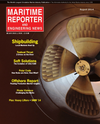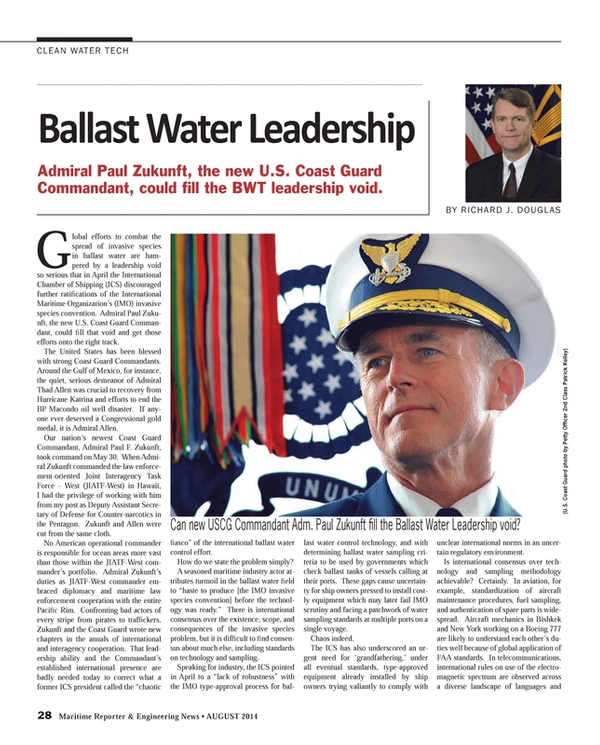
Ballast Water Leadership
Admiral Paul Zukunft, the new U.S. Coast Guard Commandant, could fill the BWT leadership void.
Global efforts to combat the spread of invasive species in ballast water are hampered by a leadership void so serious that in April the International Chamber of Shipping (ICS) discouraged further ratifications of the International Maritime Organization’s (IMO) invasive species convention. Admiral Paul Zukunft, the new U.S. Coast Guard Commandant, could fill that void and get those efforts onto the right track.
The United States has been blessed with strong Coast Guard Commandants. Around the Gulf of Mexico, for instance, the quiet, serious demeanor of Admiral Thad Allen was crucial to recovery from Hurricane Katrina and efforts to end the BP Macondo oil well disaster. If anyone ever deserved a Congressional gold medal, it is Admiral Allen.
Our nation’s newest Coast Guard Commandant, Admiral Paul F. Zukunft, took command on May 30. When Admiral Zukunft commanded the law enforcement-oriented Joint Interagency Task Force – West (JIATF-West) in Hawaii, I had the privilege of working with him from my post as Deputy Assistant Secretary of Defense for Counter-narcotics in the Pentagon. Zukunft and Allen were cut from the same cloth.
No American operational commander is responsible for ocean areas more vast than those within the JIATF-West commander’s portfolio. Admiral Zukunft’s duties as JIATF-West commander embraced diplomacy and maritime law enforcement cooperation with the entire Pacific Rim. Confronting bad actors of every stripe from pirates to traffickers, Zukunft and the Coast Guard wrote new chapters in the annals of international and interagency cooperation. That leadership ability and the Commandant’s established international presence are badly needed today to correct what a former ICS president called the “chaotic fiasco” of the international ballast water control effort.
How do we state the problem simply?
A seasoned maritime industry actor attributes turmoil in the ballast water field to “haste to produce [the IMO invasive species convention] before the technology was ready.” There is international consensus over the existence, scope, and consequences of the invasive species problem, but it is difficult to find consensus about much else, including standards on technology and sampling.
Speaking for industry, the ICS pointed in April to a “lack of robustness” with the IMO type-approval process for ballast water control technology, and with determining ballast water sampling criteria to be used by governments which check ballast tanks of vessels calling at their ports. These gaps cause uncertainty for ship owners pressed to install costly equipment which may later fail IMO scrutiny and facing a patchwork of water sampling standards at multiple ports on a single voyage.
Chaos indeed.
The ICS has also underscored an urgent need for ‘grandfathering,’ under all eventual standards, type-approved equipment already installed by ship owners trying valiantly to comply with unclear international norms in an uncertain regulatory environment.
Is international consensus over technology and sampling methodology achievable? Certainly. In aviation, for example, standardization of aircraft maintenance procedures, fuel sampling, and authentication of spare parts is widespread. Aircraft mechanics in Bishkek and New York working on a Boeing 777 are likely to understand each other’s duties well because of global application of FAA standards. In telecommunications, international rules on use of the electromagnetic spectrum are observed across a diverse landscape of languages and culture. In the hydrocarbon industry, sampling and testing procedures used in Caspian production fields are familiar to producers in Oklahoma.
If standardization is achievable, then what’s the trouble in the ballast water camp?
Why does the ICS write almost acidly in an April 8 press release that instead of searching for a “road map” to address compliance issues, IMO governments opted instead to study and (implicitly) duck the problem? For many governments, procrastination until the wolves are at the door is easier than grappling with hard issues. In the ballast water technology field, global shipping and its regulators already know how to deal with complex technology. What they lack is strong leadership to resolve issues like those which ICS put on the table.
Enter Admiral Zukunft. What could he do about this situation?
First, and perhaps most important, he could lead the U.S. Executive branch to internal consensus over U.S. ballast water control policy. Admiral Zukunft is a new figure on the block, and can provide fresh perspective, energy, and strong interagency leadership where it is needed. To make a difference internationally, the Coast Guard and Environmental Protection Agency must speak with one voice on standards and sampling.
Second, I would encourage Admiral Zukunft to take on the global ballast water regulation problem aggressively. It is an important problem aggravated by IMO member state procrastination and no firm hand on the rudder. Coast Guard and Navy personnel are trained to exercise leadership when confronted with a shipboard fire, with flooding, or with other dangers at sea. This means that someone on the scene will step forward and forcefully state – “I am in charge.” The global ballast water “fiasco” needs this.
Diplomacy is required, of course, in a field with major international implications. But Admiral Zukunft is already a well-known quantity in nations which operate much of the world’s commercial shipping. My hunch is that most would welcome his leadership on the ballast water control issue, as all nations potentially are affected by a leadership void. Whether one stands before the town council or a multilateral specialized technical organization like the IMO, leadership is no picnic. But it is vital in all settings, and no less so on the ballast water front. A distinguished officer like Admiral Zukunft could craft a consensus on how to proceed on ballast water technology under the IMO convention when it comes into force, how to reconcile the convention’s technology provisions with member state regimes, and how to build a standard sampling methodology that will provide ship owners and states the certainty they require. I believe that this work could be accomplished without doing violence to the convention’s basic integrity, and within the IMO framework.
Global shipping needs the ballast water regulation “road map” whose absence was forcefully noted by the ICS in April. In my judgment, Admiral Zukunft has the leadership skills required to chart that course. It is a worthy undertaking. There is a compelling need now for someone with his gravitas, professional knowledge, and credentials to step forward and announce: “I am in charge.”
The Author
Organizer of Mexico’s first ballast water technology conference, Richard Douglas advises transport firms about non-OECD markets. He is also a lawyer, a veteran of Iraq and the Bush Pentagon, and began adult life in a Navy engine room.
E: [email protected]
(As published in the August 2014 edition of Maritime Reporter & Engineering News - http://magazines.marinelink.com/Magazines/MaritimeReporter)
Read Ballast Water Leadership in Pdf, Flash or Html5 edition of August 2014 Maritime Reporter
Other stories from August 2014 issue
Content
- Editorial: software ... is it ‘evolution’ or ‘revolution’ ... page: 6
- Wishful Thinking From Across the Pond page: 8
- Panama Canal: The Billion Dollar Challenge page: 12
- OSV Power page: 14
- Polar Code Afoot page: 18
- Logistical Scenario Analysis for Hydrodynamic Applications page: 22
- Challenging the Myths of Pirate Violence page: 24
- Ballast Water Leadership page: 28
- Floating Production Roundup: August 2014 page: 32
- Keeping Machinery in Line with Laser Alignment page: 38
- Remote Diagnostics Help Drive Efficiency Gains page: 42
- News Flash! Greek Shipowners Prefer Bulkers page: 45
- Five Minutes with Gulf Copper’s Dennis Buffo page: 48
- BAE Systems Ship Repair: Leveraging Location, Infrastructure & Workforce page: 50
- Dry Dock Conference 2014 page: 52
- Spotlight on German Shipbuilding page: 58
- ZF Marine Makes a Strong Towboat Thrust page: 62
- Permanent Magnet Technology for Maritime Propulsion page: 62
- Ship Design and Construction Software Solutions page: 67
- Marorka’s Powerplay page: 72
- Indian Shipbuilding on the Road to Recovery page: 76
- Five Minutes with N-KOM CEO Abu Bakar Mohd Nor page: 80
- Realizing the Promise of Brazil Shipbuilding page: 84
- MTR 100: UTEC Survey Inc. page: 85
- ASRY All in on Project Jupiter page: 88
- Navantia Banks on the Future page: 89
- Energy Markets Buoy U.S. Shipbuilding page: 90
- Vigor: Frank(ly) Speaking page: 94
- Need a Lift? page: 96
- Dockside Load Testing with Unique Seaflex page: 97
- The Lowdown on Lifting page: 102
- SmartGrip: An ‘Evolution’ in Bulk Handling page: 104
- Shippers Must Reduce Costs, Boost Efficiency page: 106
- Fight Piracy – Intelligently page: 110
- Using HydroComp NavCad page: 112
- Keep it Clean & Green page: 114
- Victaulic Vic-Press System Receives Five New Type Approvals page: 119
- Bolidt Decking, Flooring page: 119
- Steering Alert System page: 119
- Bug-O Zipper Welder page: 119
- Envitia Launches MapLink Pro 8.0 page: 119
- Vosta LMG Delivers New Dredge Ball Joints page: 119
- Furuno Adds Color Display to NavPilot 700 Series page: 119


